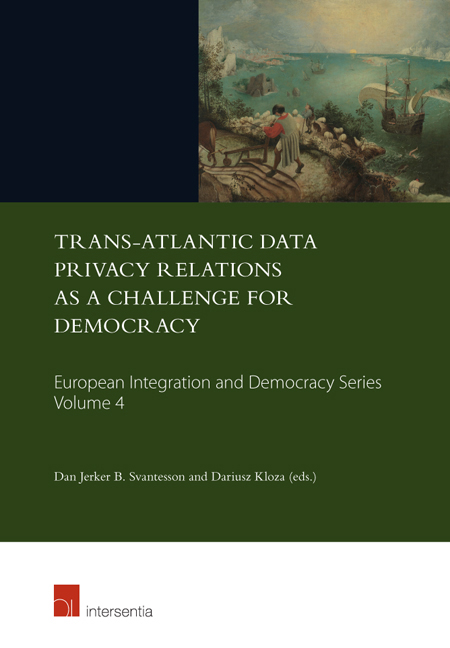Book contents
- Frontmatter
- Foreword
- Preface
- Contents
- List of Abbreviations
- PART I PRIVACY AND …
- SECTION I PRIVACY AND TRANSBORDER FLOWS OF PERSONAL DATA
- INVITED COMMENTS
- SECTION II PRIVACY AND INTERNATIONAL TRADE
- 7 From ACTA to TTIP: Lessons Learned on Democratic Process and Balancing of Rights
- 8 Free Trade Agreements and Data Privacy: Future Perils of Faustian Bargains
- INVITED COMMENT
- SECTION III PRIVACY AND TERRITORIAL APPLICATION OF THE LAW
- SECTION IV PRIVACY AND CRIME
- INVITED COMMENTS
- SECTION V PRIVACY AND TIME INVITED COMMENTS
- PART II THEORY OF PRIVACY
- PART III ALTERNATIVE APPROACHES TO THE PROTECTION OF PRIVACY
- INVITED COMMENT
- CONCLUSION
8 - Free Trade Agreements and Data Privacy: Future Perils of Faustian Bargains
from SECTION II - PRIVACY AND INTERNATIONAL TRADE
Published online by Cambridge University Press: 29 September 2018
- Frontmatter
- Foreword
- Preface
- Contents
- List of Abbreviations
- PART I PRIVACY AND …
- SECTION I PRIVACY AND TRANSBORDER FLOWS OF PERSONAL DATA
- INVITED COMMENTS
- SECTION II PRIVACY AND INTERNATIONAL TRADE
- 7 From ACTA to TTIP: Lessons Learned on Democratic Process and Balancing of Rights
- 8 Free Trade Agreements and Data Privacy: Future Perils of Faustian Bargains
- INVITED COMMENT
- SECTION III PRIVACY AND TERRITORIAL APPLICATION OF THE LAW
- SECTION IV PRIVACY AND CRIME
- INVITED COMMENTS
- SECTION V PRIVACY AND TIME INVITED COMMENTS
- PART II THEORY OF PRIVACY
- PART III ALTERNATIVE APPROACHES TO THE PROTECTION OF PRIVACY
- INVITED COMMENT
- CONCLUSION
Summary
1INTRODUCTION – BARGAINING WITH PRIVACY RIGHTS
Free Trade Agreements (FTAs) are unlikely to be sources of privacy rights, yet may act as limitations on the operation of data protection/data privacy laws Countries negotiating new bilateral or multilateral trade agreements, particularly but not exclusively the USA, are likely to attempt to include requirements that the parties do not include any significant data export restrictions or ‘data localisation’ provisions in their laws This chapter surveys the variety of ways in which FTAs have affected data privacy by considering a range of examples, without being comprehensive Examples include FTAs in which the USA is involved in both Europe and the Asia-Pacific, and a number in which the USA is not involved The extent to which the effects of FTAs on data privacy may be changing is assessed One theme of this chapter is the extent to which it is appropriate to include what are essentially human rights or civil liberties in FTAs, where they are traded against economic benefits.
An essentially chronological structure is adopted: the effect of FTAs on data privacy prior to 2016's Trans-Pacific Partnership (TPP) agreement is first considered, then the TPP's effect is analysed in some detail, followed by consideration of possible future FTAs which are still at the negotiation stage The TPP is the first multilateral trade agreement with detailed provisions relating to privacy protection Because of this, and because other potentially relevant FTAs are still at the negotiating stage and there is no final treaty text available at the time of writing, the TPP is given more extended consideration.
THE USA'S FORUM-SHIFTING ON PERSONAL DATA EXPORTS
The main effect of FTAs on data privacy concerns data exports, and the key to understanding the changing importance of FTAs in this field may lie in understanding the changing options available to the USA to achieve its goals to maximise the free flow of personal data and minimise personal data export restrictions The USA is masterful at forum-shift ing to attain its diplomatic goals: at one time it will focus on bilateral relationships, then shift to regional agreements, next global multilateral fora – and back and forth as the need requires.
Information
- Type
- Chapter
- Information
- Publisher: IntersentiaPrint publication year: 2017
Accessibility standard: Unknown
Why this information is here
This section outlines the accessibility features of this content - including support for screen readers, full keyboard navigation and high-contrast display options. This may not be relevant for you.Accessibility Information
- 2
- Cited by
